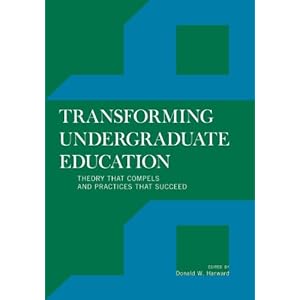Transforming Undergraduate Education: Theory that Compels and Practices that Succeed
 Donald Harward, former president of Bates College and now director of Bringing Theory to Practice (BTtoP), has edited a newly released book about undergraduate education. The 41 authors tackle the interrelated problems that students often disengage from learning, professors are alienated from teaching, and students are disconnected from communities in ways that harm them psychologically.
Donald Harward, former president of Bates College and now director of Bringing Theory to Practice (BTtoP), has edited a newly released book about undergraduate education. The 41 authors tackle the interrelated problems that students often disengage from learning, professors are alienated from teaching, and students are disconnected from communities in ways that harm them psychologically.
University of Michigan Professor Barry Checkoway, Wagner College President Richard Guarasci, and CIRCLE director Peter Levine contribute a chapter on “Renewing the Civic Purposes of Liberal Education.”
In his introduction, Don Harward cites four major themes that run through the volume. In our paraphrase, these are:
- Campus cultures can be changed.
- Liberal education has epistemological, psychosocial, and civic aspects. The three must be considered together.
- Certain troubling behaviors of students can be ameliorated by engaging them better academically.
- We have a base of effective programs and centers, but we must move toward deeper and more systematic change.





December 13th, 2011 at 5:06 am
My hope would be that Universities don’t just focus on academic achievement. I was impressed by the level of academic achievement my uni offered, but was less impressed by how they focused on ‘real world’ aspects – from training that would be useful in jobs through to an understanding of how educated students can help change the world.
Change is needed, though I would argue in many cases the educational side is fine